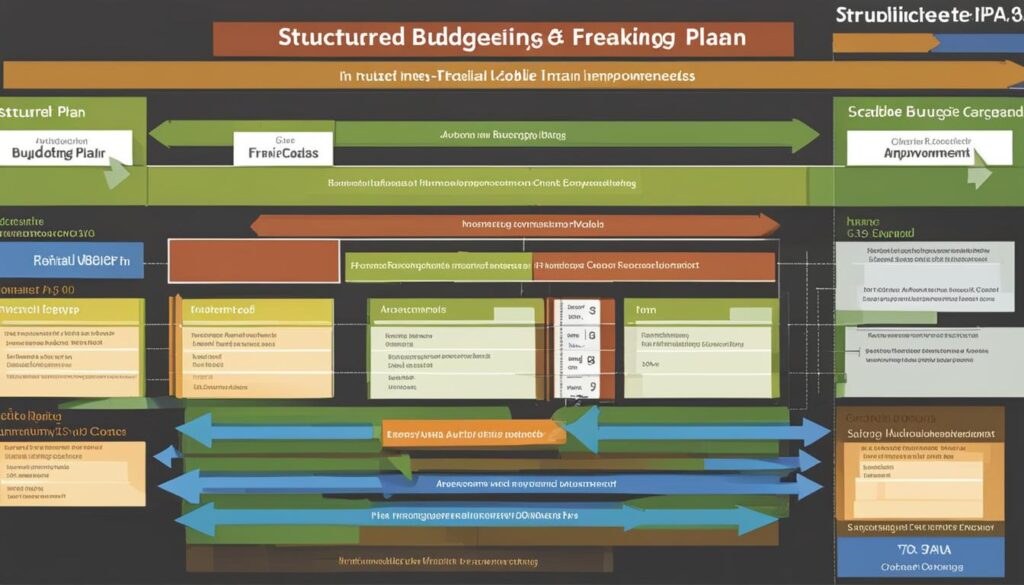Analysis paralysis in budgeting is a common challenge that many individuals face when it comes to managing their finances. The cycle of overthinking and indecision can hinder progress and prevent individuals from taking action towards their financial goals. In this article, we will explore strategies to overcome analysis paralysis and simplify the budgeting process, enabling you to make informed decisions and move forward confidently.
Key Takeaways:
- Analysis paralysis in budgeting can hinder financial progress and decision-making.
- Setting clear goals and priorities can help overcome analysis paralysis.
- Breaking the budgeting process into smaller steps can reduce overwhelm.
- Seeking support and guidance can provide valuable insights.
- Taking action and implementing the budget is crucial for progress.
Understanding Analysis Paralysis in Budgeting
Analysis paralysis in budgeting occurs when individuals are overwhelmed by the multitude of choices and options available, leading to indecision and inaction. It is often fueled by fear of making mistakes and the desire to make the “right” decision. This state of overthinking can hinder effective budgeting and financial planning, resulting in missed opportunities and increased stress.
In today’s fast-paced world, we are bombarded with an abundance of information and financial products, making it challenging to navigate through the noise and make confident decisions. The fear of making a wrong choice can paralyze us, causing us to analyze every possible scenario and become trapped in a cycle of overthinking.
When it comes to budgeting, analysis paralysis can manifest in various ways. It may involve spending excessive time researching different budgeting strategies, comparing countless financial products, or endlessly tweaking our budgeting plan. As a result, we become stuck in a state of indecision, unable to take action or make progress towards our financial goals.
Breaking free from analysis paralysis in budgeting requires awareness and a shift in mindset. Rather than striving for perfection or the elusive “right” decision, we need to embrace the idea that taking action and making imperfect progress is far better than being stuck in a cycle of overthinking. By understanding the causes and impacts of analysis paralysis, we can develop strategies to overcome it and simplify the budgeting process.
The Impact of Analysis Paralysis in Budgeting
Analysis paralysis in budgeting can have significant negative impacts on individuals and their financial well-being. The constant overthinking and indecision that come with analysis paralysis can lead to missed opportunities for savings, investments, and financial growth. When individuals are stuck in a state of limbo, unable to make decisions or take action, their financial progress is hindered and they may experience increased stress and anxiety.
The repercussions of analysis paralysis in budgeting can be far-reaching. Without timely decision-making, individuals may miss out on favorable investment opportunities or fail to optimize their savings strategy. Overthinking can also lead to a lack of action, preventing individuals from implementing their budget effectively and taking steps towards achieving their financial goals.
Moreover, analysis paralysis can have a detrimental effect on one’s mental and emotional well-being. The constant cycle of thoughts and indecision can cause increased stress and anxiety, ultimately eroding confidence in one’s ability to manage their finances. This negative impact can create a vicious cycle, as the fear of making mistakes further exacerbates the overthinking and inaction.
| Impacts | Description |
|---|---|
| Missed Opportunities | Lack of timely decision-making can result in missed opportunities for savings and investment growth. |
| Stagnation | Indecision and overthinking can lead to a lack of action, preventing progress in financial goals. |
| Increased Stress and Anxiety | The constant cycle of thoughts and indecision can cause heightened stress and anxiety levels. |
| Confidence Erosion | Analysis paralysis can erode confidence in one’s ability to manage finances effectively. |
To overcome analysis paralysis in budgeting, individuals need to break free from the cycle of overthinking and indecision. In the following section, we will explore strategies that can help individuals overcome analysis paralysis and simplify the budgeting process, allowing them to take control of their finances and make informed decisions.
https://www.youtube.com/watch?v=_JlTEHmrY5g
The Negative Impacts of Analysis Paralysis in Budgeting
Strategies to Overcome Analysis Paralysis in Budgeting
Overcoming analysis paralysis in budgeting requires a proactive approach and the adoption of effective strategies. Setting clear goals and priorities can help individuals focus their budgeting efforts and avoid getting lost in endless research and analysis. Breaking the budgeting process into smaller, manageable steps can also help in reducing overwhelm and making steady progress. Additionally, limiting options and making decisions based on essential information can simplify the decision-making process and prevent overthinking.
Setting Clear Goals and Priorities
One of the first steps in overcoming analysis paralysis in budgeting is to set clear goals and priorities. By clearly defining what you want to achieve with your budget, whether it’s saving for a specific financial goal or reducing debt, you can narrow down your focus and avoid getting overwhelmed by numerous possibilities. This clarity of purpose helps to guide your financial decisions and prevents you from falling into the trap of overanalysis.
Breaking the Budgeting Process into Manageable Steps
Another strategy to overcome analysis paralysis is to break the budgeting process into smaller, more manageable steps. Instead of trying to tackle your entire financial situation all at once, break it down into smaller tasks that you can easily accomplish. This can include creating a monthly budget, tracking your expenses, and saving a specific amount each month. By taking it step by step, you can avoid feeling overwhelmed and make steady progress towards your financial goals.
Limiting Options and Making Informed Decisions
In the face of numerous choices and options, it’s important to limit your options and make decisions based on essential information. Instead of getting lost in a sea of possibilities, narrow down your choices to a few viable options that align with your goals and priorities. Gather the necessary information, such as interest rates, fees, and potential returns, and make an informed decision based on that information. This reduces the need for excessive analysis and allows you to move forward with confidence.

By implementing these strategies, individuals can effectively overcome analysis paralysis in budgeting. Setting clear goals and priorities, breaking the budgeting process into manageable steps, and making informed decisions based on essential information are key to simplifying the decision-making process and taking control of one’s finances. Remember, the goal is to make progress rather than seeking perfection, so take action and start making informed financial decisions today.
The Power of a Growth Mindset in Budgeting
When it comes to overcoming analysis paralysis in budgeting, adopting a growth mindset can be a game-changer. A growth mindset is the belief that abilities and intelligence can be developed through dedication and hard work. In the context of budgeting, it involves embracing the idea that mistakes are a natural part of the learning process and viewing them as opportunities for growth.
By shifting your perspective and rejecting the fear of making financial decisions, you can break free from the cycle of overthinking. Instead of getting trapped in a web of analysis, a growth mindset allows you to take calculated risks and start small. This approach builds confidence and momentum in your budgeting endeavors, providing a foundation for future success.
“The only real mistake is the one from which we learn nothing.” – Henry Ford
Henry Ford’s quote serves as a powerful reminder that mistakes are not failures but stepping stones towards improvement. Embracing this mindset can help you overcome the fear of making financial decisions and take action in your budgeting journey. Remember, progress is more important than perfection, and a growth mindset will propel you forward towards your financial goals.
The Benefits of a Growth Mindset in Budgeting
A growth mindset in budgeting offers several key benefits. Firstly, it allows you to approach budgeting with a sense of curiosity and a willingness to learn. Instead of being overwhelmed by choices and possibilities, you can embrace the opportunity to explore different strategies and adapt as needed. This flexibility and openness to new ideas can lead to innovative solutions and improved financial outcomes.
Furthermore, a growth mindset helps you develop resilience and perseverance in the face of challenges. Rather than giving up when things don’t go as planned, you view setbacks as temporary obstacles that can be overcome with effort and determination. This mindset shift enables you to stay motivated and continue making progress, even in the face of adversity.
Ultimately, a growth mindset in budgeting empowers you to take control of your financial future. It allows you to break free from analysis paralysis, make informed decisions, and move towards your goals with confidence. By embracing the power of a growth mindset, you can unlock your full potential and create a brighter financial future for yourself.
Seek Support and Guidance in Budgeting
Overcoming analysis paralysis in budgeting can be a challenging task. When faced with a multitude of choices and options, it is easy to get overwhelmed and stuck in a cycle of overthinking. That’s why seeking support and guidance from financial advisors, mentors, or trusted individuals can be incredibly beneficial.
By seeking input and advice from experienced professionals, you can gain valuable insights and perspectives in budgeting. These experts can help you make more informed decisions and provide guidance on the best strategies to overcome analysis paralysis. Collaboration and exchange of ideas with others can also spark creativity and generate new approaches to budgeting.
Working with a financial advisor, for example, can provide you with personalized advice tailored to your specific financial situation. They can help you set realistic goals, create a structured budgeting plan, and develop strategies to break free from analysis paralysis. Having someone in your corner to provide support and guidance can make a significant difference in your budgeting journey.

Benefits of seeking support and guidance in budgeting:
- Gain valuable insights and perspectives.
- Make more informed decisions.
- Receive personalized advice tailored to your situation.
- Develop strategies to overcome analysis paralysis.
- Collaborate and generate new ideas.
Remember, you don’t have to go through the budgeting process alone. Seeking support and guidance can empower you to break free from analysis paralysis and take control of your finances.
Creating a Structured Budgeting Plan
Creating a structured budgeting plan is essential for overcoming analysis paralysis and empowering individuals to make informed financial decisions. A well-designed plan provides a clear roadmap and helps eliminate overwhelm by breaking down the budgeting process into manageable steps. By following these steps and incorporating key elements into their plan, individuals can gain control over their finances and reduce the tendency to overthink.
Setting Goals and Objectives
A structured budgeting plan begins with setting clear goals and objectives. This involves identifying what individuals want to achieve financially, whether it’s saving for a specific milestone, paying off debt, or investing in future ventures. By establishing specific and achievable goals, individuals can focus their budgeting efforts and avoid getting caught up in unnecessary analysis.
Tracking Income and Expenses
An effective budgeting plan requires individuals to track their income and expenses. This involves analyzing their financial inflows and outflows to gain a better understanding of their spending patterns. By keeping a detailed record of their finances, individuals can identify areas where they may need to cut back or allocate more funds, helping them make more informed decisions.
Creating Categories and Allocating Funds
Creating categories and allocating funds within the budgeting plan is crucial for effective financial management. This involves dividing expenses into different categories such as housing, transportation, groceries, and entertainment. By assigning a specific portion of their income to each category, individuals can ensure that they prioritize their spending and allocate funds accordingly. This helps prevent analysis paralysis by providing a clear framework for decision-making.
Regularly Reviewing and Adjusting the Plan
A structured budgeting plan should be regularly reviewed and adjusted to reflect changing financial circumstances and goals. By reviewing the plan periodically, individuals can identify areas where adjustments may be necessary and make informed changes. This flexibility allows for adaptability and ensures that the budgeting plan remains relevant and effective.

A structured budgeting plan provides individuals with a framework for financial decision-making, helping them overcome analysis paralysis and take control of their finances. By setting clear goals, tracking income and expenses, creating categories, and regularly reviewing the plan, individuals can simplify the budgeting process and make more confident financial choices.
Taking Action and Implementing the Budget
Now that you have identified the strategies to overcome analysis paralysis in budgeting, it’s time to take action and implement your budget. This is a crucial step in breaking free from the cycle of overthinking and indecision. By setting deadlines for decisions and holding yourself accountable, you can avoid getting stuck in analysis paralysis and start making progress towards your financial goals.
Remember, taking action doesn’t mean that your budget has to be perfect. Embrace the idea that mistakes are a natural part of the learning process. It’s better to make imperfect progress than to be stuck in overthinking and never moving forward. Start by making decisions based on the information you have and adjust your budget as you go along.
Implementing your budget also requires discipline and consistency. Stick to the spending limits you have set for yourself and track your expenses regularly. This will help you stay on top of your finances and make necessary adjustments if needed. Don’t be afraid to seek support and guidance from financial advisors or mentors who can provide valuable insights and help you stay motivated on your budgeting journey.

In summary, taking action is essential for overcoming analysis paralysis in budgeting. Set deadlines, hold yourself accountable, and start making decisions based on the information at hand. Embrace imperfection and make adjustments as you go along. With discipline and consistency, you can successfully implement your budget and move closer to achieving your financial goals.
Managing Financial Risks in Budgeting
When it comes to budgeting, managing financial risks is an essential aspect of ensuring long-term success and stability. By being proactive and prepared, individuals can minimize potential setbacks and make informed decisions. Here are some effective strategies for managing financial risks in budgeting:
Evaluate Potential Risks
Before creating a budget, it is crucial to assess the potential risks that could affect your financial situation. This includes identifying factors such as job security, market volatility, and unexpected expenses. By understanding these risks, you can allocate resources and plan accordingly.
Establish an Emergency Fund
An emergency fund is a vital component of any budgeting strategy. It acts as a safety net for unforeseen circumstances and helps you avoid accumulating debt or depleting your savings. Aim to set aside three to six months’ worth of living expenses in a separate account to provide financial security in times of crisis.
Consider Financing Options
When faced with significant expenses or investments, it may be beneficial to explore different financing options. This could include loans, credit cards, or other forms of borrowing. However, it’s important to carefully consider the terms and interest rates associated with these options to ensure they align with your budgeting goals.
Regularly Review and Adjust
Financial risks are dynamic and can change over time. Therefore, it’s crucial to regularly review and adjust your budget to reflect any new risks or changes in your financial situation. By staying proactive and responsive, you can effectively manage risks and make necessary adjustments to protect your financial well-being.
By implementing these strategies, individuals can effectively manage financial risks in their budgeting endeavors. Remember to stay vigilant, stay informed, and stay adaptable to navigate any challenges that may arise along the way.
Embracing Imperfection in Budgeting
When it comes to budgeting, many individuals fall into the trap of analysis paralysis, endlessly analyzing their options and overthinking every financial decision. However, it is important to remember that perfection is not the goal when it comes to budgeting. Instead, embracing imperfection can be a powerful strategy for overcoming analysis paralysis and making progress towards your financial goals.
By accepting that no budgeting plan is perfect, you can free yourself from the pressure of making the “right” decision and instead focus on taking action. Remember, it is better to make imperfect progress than to be stuck in a state of indecision. Start by setting clear goals and priorities, and then take small steps towards achieving them.
Another way to embrace imperfection is by being open to adjustments and improvements. Your budgeting plan should not be set in stone, but rather a living document that can be modified as circumstances change. By regularly reviewing and refining your budget, you can adapt to new challenges and opportunities that come your way.
In summary, embracing imperfection is a key strategy for overcoming analysis paralysis in budgeting. Instead of striving for perfection, focus on progress by setting clear goals, taking action, and being open to adjustments. Remember, the goal is not to have a perfect budget, but rather to have a plan that helps you make informed financial decisions and move towards your financial goals.
Conclusion
Analysis paralysis in budgeting can have detrimental effects on financial progress and opportunities for growth. By understanding the causes and impacts of analysis paralysis, individuals can take proactive steps to overcome it and achieve successful budgeting outcomes. Adopting a growth mindset and embracing imperfection are key in breaking free from the cycle of overthinking and indecision.
Seeking support and guidance from financial advisors and mentors can provide valuable insights and help individuals make informed decisions. Breaking the budgeting process into smaller, manageable steps and creating a structured budgeting plan can alleviate overwhelm and foster a clear roadmap for financial decision-making. Ultimately, taking action and implementing the budget in a timely manner is crucial for making progress.
Remember, it’s better to make imperfect progress than to be stuck in analysis paralysis. By adopting effective budgeting strategies and keeping a focus on continuous improvement, individuals can confidently navigate through financial challenges and achieve their goals.
FAQ
What is analysis paralysis in budgeting?
Analysis paralysis in budgeting refers to the state of being stuck in the cycle of overthinking and indecision when it comes to financial planning.
What are the negative impacts of analysis paralysis in budgeting?
Analysis paralysis in budgeting can lead to missed opportunities for savings, investments, and financial growth, increased stress and anxiety, and a feeling of being stuck.
How can I overcome analysis paralysis in budgeting?
Strategies to overcome analysis paralysis in budgeting include setting clear goals and priorities, breaking the budgeting process into smaller steps, limiting options, adopting a growth mindset, seeking support and guidance, creating a structured budgeting plan, taking action, managing financial risks, and embracing imperfection.
How Can Setting Realistic Financial Goals Help Me Break Free from Budgeting Paralysis?
Setting financial goals can be a game-changer when it comes to overcoming budgeting paralysis. By defining achievable objectives, you gain clarity and direction, breaking free from the overwhelming cycle of constant budgeting. These goals help you prioritize expenses, make informed financial decisions, and ultimately pave the way to financial independence. Embrace the power of setting financial goals and unlock your financial freedom.

